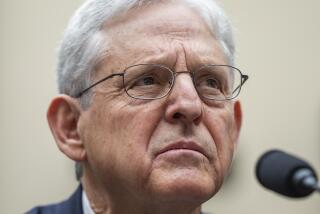Barr Opens Full Probe of House Bank Overdrafts
WASHINGTON — A Justice Department special counsel said Wednesday that he had found evidence of criminal misconduct by a few members of Congress in their dealings with the scandal-stained House bank, and the department immediately opened a full investigation to determine whether it should prosecute.
Atty. Gen. William P. Barr, responding to the final report by former federal Judge Malcolm R. Wilkey, created a new unit in the public integrity section of the criminal division to follow up on the six-month-long preliminary inquiry.
Wilkey’s report indicated that only “a very few” of the 329 members of Congress who wrote overdrafts at the bank were in danger of being indicted--far fewer than the dozens of lawmakers who retired or were defeated in their reelection bids in part because of their check-writing habits at the now-defunct bank.
“According to the records, actual criminal conduct by some members (of the House) appears to have taken place, but it is quite limited,” Wilkey said.
“Those remaining for full field criminal investigation consist almost entirely of former members of the House of Representatives, not present members,” Wilkey said.
Sources close to the inquiry said the cases of fewer than 20 members or former members remained to be resolved and some were likely to be closed without prosecution.
The public portion of Wilkey’s report named no names, nor did it give precise numbers of those still under investigation. That information was contained in a separate, confidential document given to Barr.
But a recent compilation by Roll Call, a biweekly publication specializing in congressional affairs, showed that only four incumbents reelected to the new Congress have yet to receive exoneration letters from Wilkey clearing them of any criminal wrongdoing in their bank transactions.
What came to be known as the House bank scandal erupted in late 1991 when the General Accounting Office disclosed that the privately operated House bank, then run by Sergeant-at-Arms Jack Russ, improperly allowed lawmakers to write almost unlimited overdrafts without penalties or interest payments. The bank was later closed.
The ensuing public outrage helped contribute to one of the largest congressional turnovers in history in which 91 members either retired or were voted out of office. Of the 17 members who were named in a report by the House Ethics Committee as the worst “abusers” of the bank, for example, 11 were defeated while only six were returned to office.
Many other members with fewer overdrafts retired or were rejected at the polls.
Wilkey’s inquiry began with the names of 329 members of the House who had one or more overdrafts on the House bank. After reviewing bank records, he wrote letters of exoneration before Election Day to all but nine incumbents who were seeking reelection.
Of that number, he said, three were defeated and six were reelected. Since then, two more members have said they have received letters from Wilkey clearing them of any criminal conduct.
Also still awaiting letters clearing their names were 15 members of Congress who did not seek reelection or were defeated in primaries. At least one of those, Rep. Bill Lowery (R-San Diego), who had withdrawn from the primary, received his letter from Wilkey on Wednesday.
“In some cases, further investigation may clear up quickly any outstanding questions,” Wilkey said in his report. “As to others, including some former House employees, I am recommending that a full investigation be conducted.
“In those instances where my preliminary inquiry has uncovered evidence of possible criminal conduct, only a full investigation can determine whether indictment and prosecution is appropriate,” he added.
Wilkey gave copies of his report to House Speaker Thomas S. Foley (D-Wash.) and Minority Leader Robert H. Michel (R-Ill.) and assured them that confidentiality would be maintained during the investigation of the remaining few lawmakers.
Foley said Wednesday he has not had a chance to study the report but reiterated his view that “no losses resulted to the public” because of the bank’s operation or shutdown because lawmakers were drawing against past earnings.
While Wilkey rejected that argument, he also said routine overdrafts were not of themselves a crime.
Criminal charges might be brought in certain cases in which the overdrafts were deliberate, for extraordinarily high amounts or used to replenish campaign coffers.
Wilkey said the bank’s own tolerance for overdrafts let some House members off the hook as far as prosecutions for writing bad checks were concerned.
“By honoring literally thousands of checks that most commercial banks would have returned for insufficient funds, the House bank permitted members to engage in conduct that would have been impossible (and, in some cases, even criminal) for the general public,” Wilkey said.
“When an overdraft is honored by a financial institution rather than being returned without being paid (bounced), there is ordinarily no violation of the D.C. (District of Columbia) bad-check law.
Staff writer Ronald J. Ostrow contributed to this story.
More to Read
Get the L.A. Times Politics newsletter
Deeply reported insights into legislation, politics and policy from Sacramento, Washington and beyond. In your inbox three times per week.
You may occasionally receive promotional content from the Los Angeles Times.










